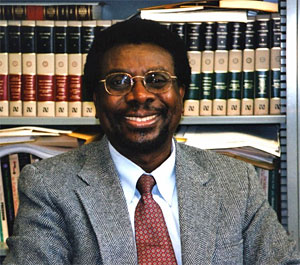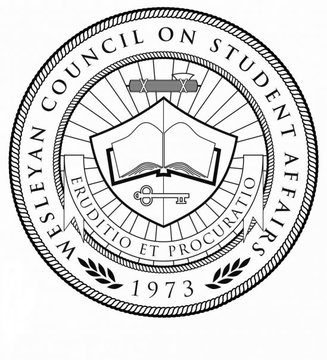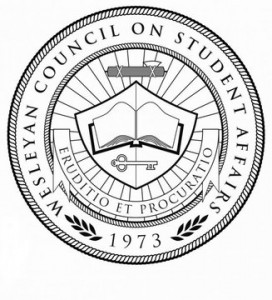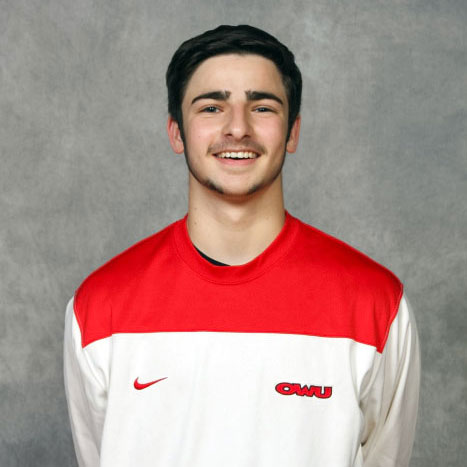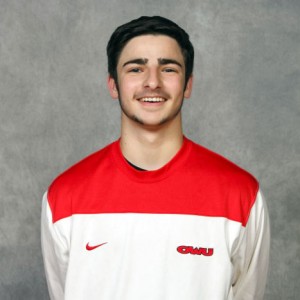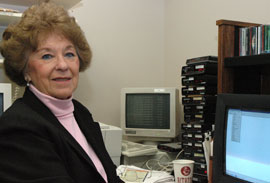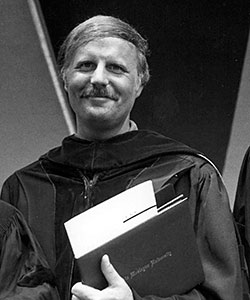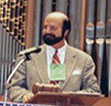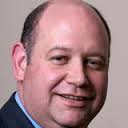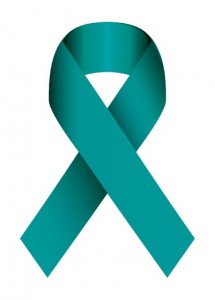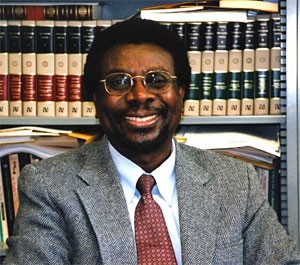
Nicole Barhorst, Transcript Correspondent
Religion can bring millions of people together, but it can also be used as a tool to divide a nation. Religion professor Emmanuel Twesigye has experienced this firsthand.
Born and raised in Uganda, Twesigye worked to spread peace and religious acceptance in opposition to the oppressive regime of Idi Amin, a military general who took over as Ugandan president in 1971. Twesigye managed to escape with his life, but not everyone was as lucky.
Note: The following interview has been condensed for space.
Q: What was growing up in Uganda like?
A: I was born a British subject because Uganda was under British rule until 1962 when Uganda became independent. We grew up singing the British anthem. So for me it was wonderful, except that now I realize we received a British education. In high school, I never had a single African teacher. Elementary school had African teachers, but high school had all English teachers … even history was British history.
Q: Can you provide your perspective on Uganda’s political upheaval while you were there?
A: That’s a painful topic. When I first came to the U.S., I was told, “Don’t talk about it. It might create political hostilities between you and the government in Uganda. Your silence will be part of your protection.” But now most of the people who were involved in the persecution there have suffered and died.
General Amin was a Muslim in Uganda’s military and was semi-illiterate. The British government promoted him to high ranks because he was a stooge of the British … President Obote inherited this military structure in which Idi Amin was the top military officer.
In Uganda there were two religious factions: the Anglicans, who ruled the country … and another group of Catholics who did not have political power.
[Obote] created one state. He wanted to unify both the Anglicans and the Catholics who had formed two separate political partie s… And so you had a government which was Anglican in structure and resented by a majority of Catholics, and you also had Muslims who were left out of the two political groups.
Then, in 1970, [Obote] declared he was going to adopt African socialism, and the British thought, “Oh, that’s dangerous. This guy’s getting out of hand.” … They went back to Idi Amin and told him, “We created you. We need you. Kick out your president and be the new president.” So Idi Amin, a Muslim, overthrew the president … but Idi Amin had another agenda [the British] didn’t know about. He had been talking to some Muslims from Libya and Saudi Arabia, and so when he took over, Gaddafi (Libyan dictator) said, “Now you better join us to form this Islamic league.” He did, even though Uganda was 85 percent Christian. The Muslims at the time were 7 percent.
Q: What was your life like when all of this was happening?
A: As an assistant chaplain at Makerere [University], I organized the bishops to protest against Idi Amin and his oppressive measures … When you are a chaplain, it’s heartbreaking for you to bury young people because of a dictator who has ordered for them to be shot. I said, “We have got to protest.” The archbishop said, “I can’t do that because they will kill him and they will kill his family.” But when this happened for over a year and he had to bury the dead he ended up saying, “It’s okay now, but you have got to go mobilize the bishops.”
It took me three months to persuade [the bishops] to consent, and then when they agreed, the archbishop asked me to write a letter which would be used as a point of discussion, and then would be sent to Idi Amin. In it, I had written all the grievances I could think about, mainly political and military oppression, killings and murders of innocent civilians by military groups, people disappearing at night.
Of course, Idi Amin was so angry, and that’s when he vowed to retaliate and kill us. I don’t know how he knew I was one of those who drafted the letter, but he sent a message to me saying if the archbishop acts on this, he will be dead and I will be dead, too.
I warned the archbishop … and he said, “Let God’s will be.” And that’s how he went and got killed that day, and they began looking for me. I went to hide in the dorms … but why I had enough time to hide was because one of my maids happened to be shopping at the corner store, and these people came there to find and arrest me. Talk about divine providence. Who was at the counter? My maid, buying bread and sugar. I will never probably do enough to reward her. She told them where the Catholic chaplain lived, and she came and told me, “They are really coming for you.”
Then I went and took a few things to go and hide. It was rough time … So now I know the price to be paid when you stand for peace and justice.
Q: Do you think you’ll ever return to Uganda?
A: We left Uganda and I refuse to go back and take my position in the cabinet of the new government because my wife said, “You have a loud mouth.” She didn’t want me running out again because this time I might not be so lucky.
Q: Where does your passion for theology stem from?
A: My father’s an Anglican minister. He’s retired now … And so it was a debate between me and him even on matters of evolution. He was a creationist. I was an evolutionist. I was supposed to go into medicine, but I ended up saying somebody has got to teach the world that God didn’t create the universe in six days.
Some people say, “Are you really a priest writing on evolution?” It became a passion, a mission, and I love it … There are students who think I’m an atheist, but I try to be a voice of reason for all.
Q: There have been some incidents at OWU over the years of students acting in racist and inappropriate ways to you. Can you tell me about this?
A: I had just come and this student left a voicemail on my answering machine actually saying I should change a test date, otherwise they would shave my nappy head.
But the chaplain had actually warned me that this place could be racist because the week before I came for the interview, someone had vandalized the shanties on the JayWalk that were protesting South African apartheid. He said, “When you come, don’t be horrified when you see things like this.” So, I had been forewarned and I am grateful he warned me.
Q: What are your plans for the future?
A: I don’t have any plans yet. I want to teach here. I’m working on a new book on critical issues in religion and ethics, and I’m excited about that, so I still want to teach until I’m too old to teach.
